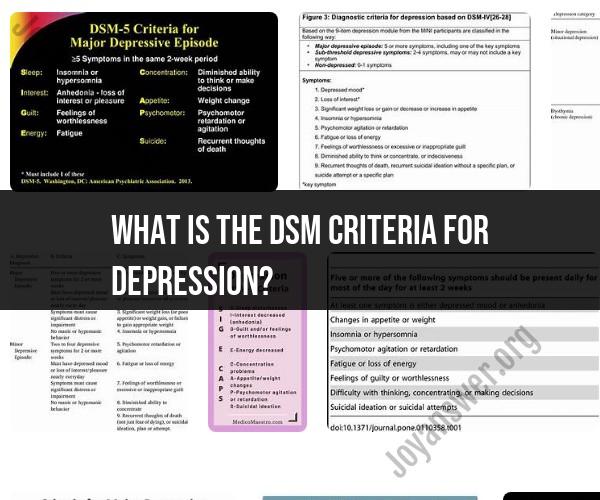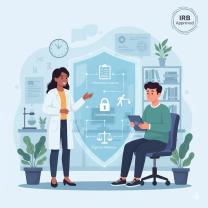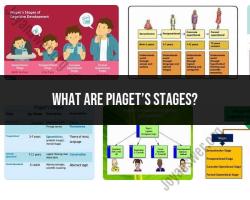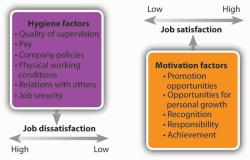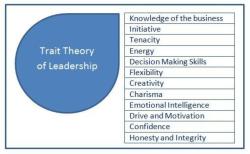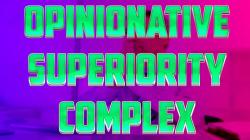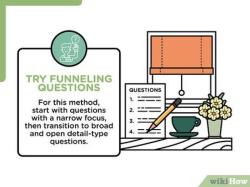What is the DSM criteria for depression?
The Diagnostic and Statistical Manual of Mental Disorders, Fifth Edition (DSM-5), provides specific criteria for the diagnosis of Major Depressive Disorder (MDD), which is a common form of depression. To receive a diagnosis of MDD, a person must meet specific criteria, which include experiencing a certain number of symptoms for a specific duration. Here are the DSM-5 criteria for Major Depressive Disorder:
A. Five (or more) of the following symptoms must be present during the same 2-week period and represent a change from previous functioning; at least one of the symptoms is either (1) depressed mood or (2) loss of interest or pleasure:
Depressed Mood: The individual experiences a persistent sad, empty, or irritable mood most of the day, nearly every day.
Loss of Interest or Pleasure: The individual no longer enjoys activities or interests that they previously found enjoyable.
Significant Weight Change: A noticeable increase or decrease in appetite or weight (not due to dieting) occurs.
Sleep Disturbance: There is a significant change in sleep patterns, such as insomnia (difficulty falling asleep or staying asleep) or hypersomnia (excessive sleep).
Psychomotor Agitation or Retardation: Observable restlessness or slowed movements and speech are present.
Fatigue or Loss of Energy: The individual consistently feels tired or lacks energy, even with normal activities.
Feelings of Worthlessness or Guilt: The individual experiences persistent feelings of worthlessness or excessive guilt.
Difficulty Concentrating: The ability to think, concentrate, or make decisions is noticeably impaired.
Suicidal Thoughts: Recurrent thoughts of death, suicidal ideation, or a suicide attempt may be present.
B. The symptoms cause significant distress or impairment in social, occupational, or other important areas of functioning.
C. The episode is not attributed to the physiological effects of a substance (e.g., a drug or medication) or another medical condition.
D. The symptoms are not better explained by another mental disorder, such as bipolar disorder or a psychotic disorder.
E. There has never been a manic or hypomanic episode (distinct periods of abnormally elevated mood) during the course of the depressive symptoms.
To receive a diagnosis of Major Depressive Disorder, an individual must meet criteria A through E. It's important to note that depression is a complex mental health condition, and the severity and duration of symptoms can vary widely among individuals. A diagnosis should be made by a qualified mental health professional based on a comprehensive assessment.
If you or someone you know is experiencing symptoms of depression, it's crucial to seek help from a healthcare provider or mental health professional. Effective treatments, including therapy and medication, are available to help manage and alleviate the symptoms of depression. Depression is a treatable condition, and early intervention can lead to better outcomes.
Demystifying Depression: The DSM Criteria for Diagnosis
Depression is a common and serious medical illness that negatively affects how you feel, the way you think and how you act. It can lead to a variety of emotional and physical problems and can decrease your ability to function at work and at home.
To be diagnosed with depression, you must meet five or more of the following symptoms for at least two weeks:
- Depressed mood most of the day, nearly every day, as indicated by either subjective report (e.g., feels sad, empty, hopeless) or observation by others (e.g., appears tearful). (Note: In children and adolescents, can be irritable mood.)
- Markedly diminished interest or pleasure in all, or almost all, activities most of the day, nearly every day (either by subjective account or observation).
- Significant weight loss when not dieting or weight gain (e.g., a change of more than 5% of body weight in a month), or decrease or increase in appetite nearly every day. (Note: In children, consider failure to make expected weight gains.)
- Insomnia or hypersomnia nearly every day.
- Psychomotor agitation or retardation nearly every day (observable by others, not merely subjective feelings of restlessness or being slowed down).
- Fatigue or loss of energy nearly every day.
- Feelings of worthlessness or excessive or inappropriate guilt (which may be delusional) nearly every day (not merely self-reproach or guilt about being sick).
- Diminished ability to think or concentrate, or indecisiveness, nearly every day (either by subjective report or observation by others).
- Recurrent thoughts of death, recurrent suicidal ideation without a specific plan, or a suicide attempt or a specific plan for committing suicide.
Diagnosing Depression: A Close Examination of DSM-5 Criteria
The Diagnostic and Statistical Manual of Mental Disorders, Fifth Edition (DSM-5) is the standard reference book used by mental health professionals to diagnose mental disorders. The DSM-5 criteria for depression are designed to help clinicians identify individuals who are experiencing a major depressive episode.
Understanding Depressive Disorders: The Role of the DSM-5 in Diagnosis
The DSM-5 plays an important role in the diagnosis of depressive disorders. The DSM-5 criteria are used by clinicians to assess an individual's symptoms and determine whether they meet the criteria for a major depressive episode or another depressive disorder.
If you are experiencing symptoms of depression, it is important to talk to your doctor or a mental health professional. They can assess your symptoms and make a diagnosis. If you are diagnosed with depression, there are a number of effective treatments available, including medication, therapy, and lifestyle changes.
Additional Information
It is important to note that the DSM-5 criteria are just a guide. Clinicians use their judgment and experience to determine whether an individual meets the criteria for a depressive disorder. It is also important to note that depression is a spectrum disorder, meaning that the severity of symptoms can vary from person to person.
If you are concerned that you or someone you know may be experiencing depression, please reach out for help. There are many resources available, including your doctor, mental health professionals, and support groups.
